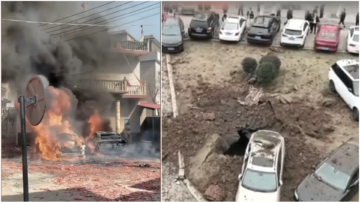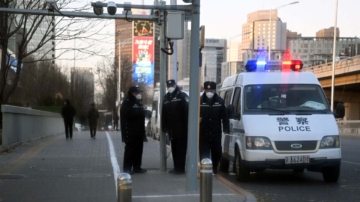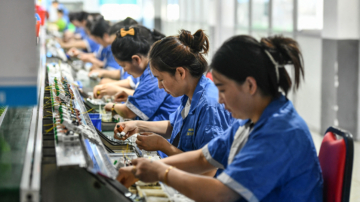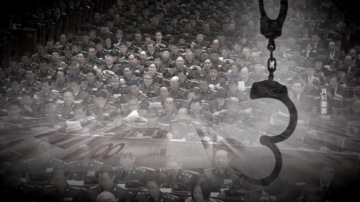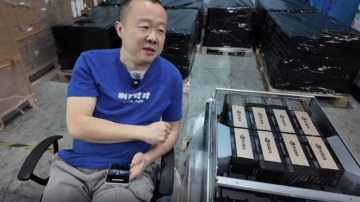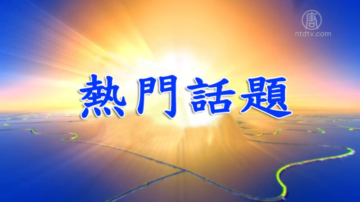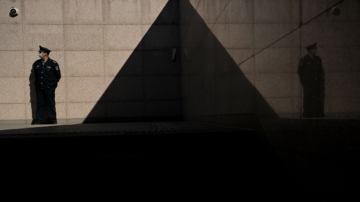【新唐人2012年6月1日訊】最新一期《學習時報》,刊登了習近平在5月16號中央黨校的講話,他說,大批當前一些黨員和幹部存在「假大空」的問題,他承認,當前世情、國情、黨情繼續發生深刻變化,前進中還會遇到各種可以預見和難以預見的矛盾和問題,但「不提超越階段目標」。所謂「超越階段目標」是指甚麼目標?分析認為,習近平是在擔憂中共正面臨的解體問題。
習近平在最近講話中批評當前一些黨員和幹部,存在不按客觀規律辦事,急功近利,說假話、大話、空話的問題。他說,領導幹部一定要求真務實----講實情、講真話,出實招、辦實事、求實效。
網絡作家吳建國認為,這些大道理講起來容易,但實行起來非常難。
網絡作家 吳建國:「特別是中共本來就是靠欺哄訛詐起家的,從戰爭年代到和平時期,都是靠謊言來維持這個政權。中共的大多數官員也是靠假大空來謀取的官位。因此他提出的這個所謂的務實是沒有實際意義的。」
而時事評論員史達質疑:習近平呼籲的「講真話」能講到甚麼程度?中共歷史上的罪惡、鎮壓法輪功、活摘器官、天安門自殺偽案、六四屠殺、江澤民賣國等等這些都可以講嗎?
史達認為,習近平為了救中共,大批「假大空」,這很像鄧小平當年提出的「摸著石頭過河」的實用主義,就是為了解救中共在極大的危機的時候,提出的一個辦法。
時事評論員 史達:「習近平提出這個反對假大空、講真話,策略上是一個進退之策吧,他不要像溫家寶這樣提出現在馬上進入改革這樣的方式,同時他在另一方面是反對和壓制了血債派,因為他說要開放言論嘛。講(真相)出來之後,我想中共真的會倒臺,包括清算血債派和清算江澤民,所以它是一個又可以進、又可以退的一個策略。」
習近平在講話中還承認,當前世情、國情、黨情繼續發生深刻變化,前進中還會遇到各種可以預見和難以預見的矛盾和問題。但「不提超越階段的目標」。吳建國表示,這一切說明習近平已經感受到中共面臨解體的危機。
吳建國:「他所謂的『不提超越階段的目標』,我的理解是,他還是要盡力維護中共政權,所謂的『不超越階段的目標』,或許就是不去想中共解體的事,而盡力挽救中共面臨的解體危機。」
有分析認為,十八大後習近平就會成為中國的第一號人物,但是對他來說,老大也不是那麼好當的,面對南海衝突、陳光誠事件、海外孔子學院問題,還有一直沒有平息的「重慶事件」,以及不斷出現的各種社會問題,習近平的擔憂,其來有自。
吳建國表示,在一些關鍵問題,比如政改問題上,習近平都是含糊其詞,或許是他在隱藏自己的觀點。他認為,如果習近平真有誠意求真務實,那就把「六四事件」和「鎮壓法輪功」的真相揭露出來。但是,那樣就可能導致中共解體。因此,不是習近平做不到,而是他願不願意做的問題。
採訪編輯/常春 後製/孫寧
Xi Jinping Criticizes Dishonesty to Avoid Fall of CCP
Study Times recently published a speech by Xi Jinping
from May 16.
The speech took place at the CCP's Party School
of the Central Committee.
Xi said in the speech that “dishonesty, boasting
and hollowness” is currently a common problem among many Party members.
He acknowledged critical changes in the current global
situation, as well as China and the CCP.
However, he refused to address any topic
“beyond the current stage.”
Analysts believe such topics are on the disintegration of
the CCP. This worries Xi and other CCP leaders.
In his recent talk Xi Jinping criticized some Party members
for disobeying objective rules.
He also criticized pursuing short-term success
with lies, boasting and hollow words.
He required CCP cadres to be honest and down to earth.
He encouraged them to tell the truth, take real measures,
do practical work, and seek practical results.
Internet writer Wu Jianguo believes that these slogans
are easier said than done.
Wu Jianguo: “CCP was established upon lies and blackmail.
Throughout times of war and peace,
it maintains its rule only by lying.
Most CCP officials also rely upon
hypocrisy to obtain their positions.
Therefore, the so-called 『honesty' Xi
proposed bears no significance.”
Political critic Shi Da questioned to what extent Chinese
people tell the truth as Xi Jinping required.
Would it be possible for people to talk about the suppression
of Falun Gong, organ harvesting, or staged “self-immolation”
in Tiananmen Square, June 4 massacre, Jiang Zemin's
traitorous deeds, or other crimes the CCP has committed?
Shi Da believes that Xi's criticism of dishonesty
and hollowness largely resembles Deng Xiaoping's
pragmatic policy of “feeling one's way through the river.”
Both are strategies rendered at critical times
to save the life of the CCP.
Shi Da: “Xi Jinping's criticism of dishonesty
and hollowness is a temporary strategy.
It is different from Wen Jiabao's call for immediate reform.
On the other hand, he proposes free speech, which opposes
those CCP leaders who have committed bloody crimes.
When people can freely tell the truth, I believe the CCP will
really disintegrate.
This will be followed by the judgment and punishment
of Jiang Zemin. In that sense, it could be a strategy of change.”
Xi Jinping also admitted the changes in the current global
situation, China, and the CCP, as well as potential problems and difficulties.
He asked, however, not to exceed
“goals of the current stage.”
Wu Jianguo said Xi's speech indicates
his awareness of the CCP's crisis of disintegration.
Wu Jianguo: “As I understand it, Xi Jinping still tries
to preserve CCP rule.
So-called “goals of the current stage” means avoiding
CCP disintegration and trying to solve its current crisis.”
Some analysts believe that after the CCP 18th Assembly,
Xi Jinping will become the CCP No.1 leader.
As President, he will have to face current problems,
including conflicts in the South China Sea,
Chen Guangcheng, deportation of the Confucius Institute
faculty, and the on-going Chongqing political scandal.
Xi Jinping has good reasons to be worried.
Wu said that Xi Jinping has been silent on a number
of key issues, such as political reform. Xi might have been hiding his opinions.
Wu believes that Xi should expose the truth of the Tiananmen
incident and the persecution of Falun Gong, if he really means to be sincere and honest.
That might, however, lead to the CCP's disintegration.
Therefore, it is a problem of how Xi wants to address these issues.
習近平在最近講話中批評當前一些黨員和幹部,存在不按客觀規律辦事,急功近利,說假話、大話、空話的問題。他說,領導幹部一定要求真務實----講實情、講真話,出實招、辦實事、求實效。
網絡作家吳建國認為,這些大道理講起來容易,但實行起來非常難。
網絡作家 吳建國:「特別是中共本來就是靠欺哄訛詐起家的,從戰爭年代到和平時期,都是靠謊言來維持這個政權。中共的大多數官員也是靠假大空來謀取的官位。因此他提出的這個所謂的務實是沒有實際意義的。」
而時事評論員史達質疑:習近平呼籲的「講真話」能講到甚麼程度?中共歷史上的罪惡、鎮壓法輪功、活摘器官、天安門自殺偽案、六四屠殺、江澤民賣國等等這些都可以講嗎?
史達認為,習近平為了救中共,大批「假大空」,這很像鄧小平當年提出的「摸著石頭過河」的實用主義,就是為了解救中共在極大的危機的時候,提出的一個辦法。
時事評論員 史達:「習近平提出這個反對假大空、講真話,策略上是一個進退之策吧,他不要像溫家寶這樣提出現在馬上進入改革這樣的方式,同時他在另一方面是反對和壓制了血債派,因為他說要開放言論嘛。講(真相)出來之後,我想中共真的會倒臺,包括清算血債派和清算江澤民,所以它是一個又可以進、又可以退的一個策略。」
習近平在講話中還承認,當前世情、國情、黨情繼續發生深刻變化,前進中還會遇到各種可以預見和難以預見的矛盾和問題。但「不提超越階段的目標」。吳建國表示,這一切說明習近平已經感受到中共面臨解體的危機。
吳建國:「他所謂的『不提超越階段的目標』,我的理解是,他還是要盡力維護中共政權,所謂的『不超越階段的目標』,或許就是不去想中共解體的事,而盡力挽救中共面臨的解體危機。」
有分析認為,十八大後習近平就會成為中國的第一號人物,但是對他來說,老大也不是那麼好當的,面對南海衝突、陳光誠事件、海外孔子學院問題,還有一直沒有平息的「重慶事件」,以及不斷出現的各種社會問題,習近平的擔憂,其來有自。
吳建國表示,在一些關鍵問題,比如政改問題上,習近平都是含糊其詞,或許是他在隱藏自己的觀點。他認為,如果習近平真有誠意求真務實,那就把「六四事件」和「鎮壓法輪功」的真相揭露出來。但是,那樣就可能導致中共解體。因此,不是習近平做不到,而是他願不願意做的問題。
採訪編輯/常春 後製/孫寧
Xi Jinping Criticizes Dishonesty to Avoid Fall of CCP
Study Times recently published a speech by Xi Jinping
from May 16.
The speech took place at the CCP's Party School
of the Central Committee.
Xi said in the speech that “dishonesty, boasting
and hollowness” is currently a common problem among many Party members.
He acknowledged critical changes in the current global
situation, as well as China and the CCP.
However, he refused to address any topic
“beyond the current stage.”
Analysts believe such topics are on the disintegration of
the CCP. This worries Xi and other CCP leaders.
In his recent talk Xi Jinping criticized some Party members
for disobeying objective rules.
He also criticized pursuing short-term success
with lies, boasting and hollow words.
He required CCP cadres to be honest and down to earth.
He encouraged them to tell the truth, take real measures,
do practical work, and seek practical results.
Internet writer Wu Jianguo believes that these slogans
are easier said than done.
Wu Jianguo: “CCP was established upon lies and blackmail.
Throughout times of war and peace,
it maintains its rule only by lying.
Most CCP officials also rely upon
hypocrisy to obtain their positions.
Therefore, the so-called 『honesty' Xi
proposed bears no significance.”
Political critic Shi Da questioned to what extent Chinese
people tell the truth as Xi Jinping required.
Would it be possible for people to talk about the suppression
of Falun Gong, organ harvesting, or staged “self-immolation”
in Tiananmen Square, June 4 massacre, Jiang Zemin's
traitorous deeds, or other crimes the CCP has committed?
Shi Da believes that Xi's criticism of dishonesty
and hollowness largely resembles Deng Xiaoping's
pragmatic policy of “feeling one's way through the river.”
Both are strategies rendered at critical times
to save the life of the CCP.
Shi Da: “Xi Jinping's criticism of dishonesty
and hollowness is a temporary strategy.
It is different from Wen Jiabao's call for immediate reform.
On the other hand, he proposes free speech, which opposes
those CCP leaders who have committed bloody crimes.
When people can freely tell the truth, I believe the CCP will
really disintegrate.
This will be followed by the judgment and punishment
of Jiang Zemin. In that sense, it could be a strategy of change.”
Xi Jinping also admitted the changes in the current global
situation, China, and the CCP, as well as potential problems and difficulties.
He asked, however, not to exceed
“goals of the current stage.”
Wu Jianguo said Xi's speech indicates
his awareness of the CCP's crisis of disintegration.
Wu Jianguo: “As I understand it, Xi Jinping still tries
to preserve CCP rule.
So-called “goals of the current stage” means avoiding
CCP disintegration and trying to solve its current crisis.”
Some analysts believe that after the CCP 18th Assembly,
Xi Jinping will become the CCP No.1 leader.
As President, he will have to face current problems,
including conflicts in the South China Sea,
Chen Guangcheng, deportation of the Confucius Institute
faculty, and the on-going Chongqing political scandal.
Xi Jinping has good reasons to be worried.
Wu said that Xi Jinping has been silent on a number
of key issues, such as political reform. Xi might have been hiding his opinions.
Wu believes that Xi should expose the truth of the Tiananmen
incident and the persecution of Falun Gong, if he really means to be sincere and honest.
That might, however, lead to the CCP's disintegration.
Therefore, it is a problem of how Xi wants to address these issues.

